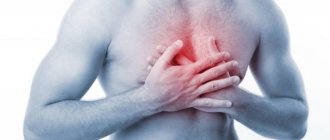High blood pressure, a problem that everyone has heard of. But low blood pressure also occurs quite often, even in young people. If with hypertension everything is more or less clear, there is a clear gradation of numbers, then with hypotension it is not possible to focus only on numbers. One person feels great with a blood pressure of 90/60, but feels unwell when the pressure rises to 120/60. Another person with low blood pressure feels weak and lacks strength.
What it is
Reduced blood pressure is considered to be less than 100/60 mmHg. Art. Sometimes this may be physiological hypotension, which does not cause deterioration in well-being. Such individual characteristics can be caused by heredity and a person’s physique. They are also found among residents of high mountain regions, tropics, and athletes. A person usually finds out about this by accident and has no complaints1.
If low blood pressure is accompanied by symptoms of malaise, we can talk about pathology. Often, episodes of low blood pressure begin in childhood and adolescence as manifestations of neurocirculatory dystonia. Then they become regular and can develop into chronic arterial hypotension2.
If arterial hypotension is a consequence of other diseases, it is necessary to carry out treatment aimed at these problems. What can cause low blood pressure:
- anemia;
- chronic diarrhea;
- severe varicose veins, which leads to retention of a large volume of blood in the lower extremities;
- consequences of taking diuretics, antihypertensive drugs, barbiturates, antidepressants;
- adrenal insufficiency;
- tonsillitis;
- gastritis, peptic ulcer;
- diseases of the liver and biliary tract;
- heart diseases.
There are many reasons, so a medical examination and examination is required to establish the correct diagnosis.
Sometimes such an unusual combination of hypotension in an upright position with hypertension in a supine position is detected. Since blood pressure is usually measured while sitting, hypertension may not be detected immediately.
To establish a correct diagnosis, a medical examination and examination is required.
Treatment methods
The treatment method for high or low blood pressure, nausea, and headache depends on the exact diagnosis. It is prescribed only based on diagnostic results and often involves taking specific medications. It is important to understand that independent selection of medications can aggravate the situation and lead to undesirable consequences.
- Drug treatment is the main stage of therapy. The doctor selects medications to correct blood pressure for hyper- or hypotension and describes in detail the regimen for taking them. You may also need a course of vitamins, and for chronic hypertension, diuretics.
- Diet is a necessary condition for high or low blood pressure, as well as for atherosclerosis. The patient needs to give up fried foods and sweets, limit the intake of salt and fast carbohydrates.
- Work and rest schedule is one of the main points. It is important to ensure a good night's sleep and make time for light physical activity. These conditions will help stabilize blood pressure and improve the functioning of the cardiovascular system.
Clinically, the Brain Institute specializes in the diagnosis and treatment of disorders that are accompanied by headache, nausea, blood pressure, and general deterioration of well-being. Experienced specialists, modern equipment, highly qualified personnel are the main advantages of the center. Here you can undergo treatment in a hospital setting, under round-the-clock supervision by doctors, and also receive recommendations for maintaining health at home.
Clinical Brain Institute Rating: 4/5 — 5 votes
Share article on social networks
Symptoms of hypotension
The symptoms that occur are usually caused by a lack of blood supply to the brain and heart. Here are typical manifestations1:
- headache;
- dizziness, imbalance;
- nausea;
- severe weakness;
- memory impairment;
- decreased performance;
- intolerance to bright light, harsh sounds, stuffiness.
Deterioration in health is accompanied by pain in the heart, rapid or slow heartbeat, and rhythm disturbances.
As soon as such a person gets out of bed in the morning and starts walking, he feels worse due to an even greater decrease in blood pressure, so he wants to go back to bed. Additional symptoms:
- coldness and impaired sensitivity of the extremities (fingers);
- symptoms worsen due to fatigue, stress, lack of sleep, acute infections and exacerbation of any chronic diseases.
Diagnostic methods
If you feel sick and have a headache, it is important to determine what pressure the patient has. This can be done at home using a tonometer. The most informative results are in dynamics, so it is better to take several measurements with a short interval. The Clinical Institute of the Brain has all the conditions and modern equipment for full diagnostics. Experienced doctors will prescribe additional examinations that will make it possible to make an accurate diagnosis and establish the cause of poor health.
- Blood tests are one of the first stages. Clinical analysis will help determine the level of hemoglobin, the number of red blood cells and other elements. Based on biochemical analysis, dysfunction of the heart and other organs can be suspected. Separately, the doctor can measure blood glucose levels and prescribe additional tests to determine the concentration of various vitamins and microelements.
- Dopplerography is an examination of blood vessels using ultrasound using a contrast agent. More often, this technique is prescribed when a violation of cerebral blood flow is suspected. Ultrasound of the vessels of the head is informative if chronic cerebral ischemia, thrombosis, or aneurysms are suspected.
- MRI, CT scan of the brain is the most accurate, informative diagnostic method for stroke, various brain tumors and other pathologies. Using a tomograph, you can get a complete three-dimensional picture and detect any disorders of the brain. The technique is complex and requires highly qualified specialists, but is available at the Clinical Brain Institute.
Pressure surges, nausea, headache - these signs may indicate a stroke. At home, you can carry out its initial diagnosis, but even if there is no positive response to the tests, it is recommended to consult a doctor. The patient should be asked to smile, raise both hands in front of him, and repeat a simple sentence. In this way, it is possible to determine disturbances in coordination of movements, facial expressions and speech, characteristic of damage to certain areas of the brain. Further treatment is carried out only in a hospital setting, aimed at restoring lost functions.
How to raise blood pressure
Oddly enough, drinking coffee and tea in the morning is not recommended, but it is better to avoid it altogether. The desire to get a “charge of vigor” in the morning first becomes a habit, and then turns into doping and requires a constant increase in the dose1.
Moderate loads with a smooth increase in duration have a positive effect. For example, walking, exercise bike, gentle jogging, skiing, swimming.
Static loads with a forced posture (working at a computer), tilting the head, lifting heavy objects are best avoided. If it is impossible to alternate them with physical activity.
In the morning, you need to learn to get up slowly so as not to cause a drop in blood pressure. Compression stockings on your legs may also help. It will reduce the amount of blood in the veins of the lower extremities. For training, you can sleep with the head of the bed elevated.
It is better to avoid static loads with a forced posture
Questions for the doctor
Nausea as a sign of blood pressure fluctuations
So at what pressure do you feel sick – high or low? My mother has hypertension, but when her blood pressure rises, she only complains of severe headache and dizziness.
Hello! Nausea and vomiting can be signs of both high and low blood pressure. And, of course, these symptoms are not strictly “mandatory” for hypo- or hypertension. For many patients, they are not typical despite a significant increase or decrease in blood pressure.
Prevention of hypertension
Hello! Is it possible to somehow prevent the development of hypertension? Both parents had problems with blood vessels; my father died of a stroke last year. Now I am 46 years old, blood pressure is 120-130/80, no special complaints.
Good day! No matter how trivial it may sound, the best prevention of arterial hypertension is leading a healthy lifestyle. Watch your weight, limit the amount of salt in your diet, try to move more, and don’t get nervous over trifles. And, of course, visit your doctor regularly for preventive examinations.
Physiotherapeutic procedures
- Cryochamber.
- Rubbing with warm water with a gradual decrease in temperature to 10-15*C.
- Charcot/rain/circular shower.
- Turpentine, carbon dioxide, mineral baths.
- Other tonic effects.
It is most convenient to receive a set of procedures during sanatorium-resort treatment. This allows you to take your mind off the stress of everyday life, normalize your sleep and diet. Walking and a good emotional background will make an important contribution to the healing process.
Drugs
To normalize tone, it is possible to take adaptogens in courses1:
- Eleutherococcus;
- ginseng;
- Aralia;
- pantocrine;
- lemongrass
If arterial hypotension is a consequence of other diseases, it is necessary to carry out treatment aimed at these problems.
In case of adrenal insufficiency, lifelong replacement therapy may be prescribed. Depending on the type of violation, the following is used:
- glucocorticoids (cortef);
- mineralocorticoids (cortineff).
A special case and difficulty for the doctor and the patient is the combination of arterial hypotension and hypertension. Since the treatment methods are radically opposite, choosing the right treatment method is not easy.
In any case, the prescription and correction of treatment should be made by a doctor. At the same time, success in treatment cannot be achieved without the patient’s efforts.
Increased blood pressure
High blood pressure, or hypertension, is another common disease of the circulatory system. As a rule, it develops in patients over 40 years of age and is more common in women.
Table 2: Degrees of arterial hypertension:
| AH degree | Indicators, mm Hg. Art. | |
| GARDEN | DBP | |
| High normal blood pressure | 130-140 | 85-90 |
| 1st degree | 140-160 | 90-100 |
| 2nd degree | 160-180 | 100-110 |
| 3rd degree | ↑ 180 | ↑ 110 |
High blood pressure numbers are dangerous: hypertension often causes fatal complications such as acute coronary syndrome (heart attack), stroke (stroke), etc. In addition, episodes of increased blood pressure are difficult to tolerate for most patients.
Why do you feel sick with high blood pressure, and what other symptoms are accompanied by this disease? Let’s find out.
BP readings can be alarmingly high
Causes and pathogenesis
Risk factors for the development of arterial hypertension are varied.
What are the causes of high blood pressure and dizziness:
- hereditary predisposition;
- excess body weight;
- consuming large amounts of table salt;
- smoking;
- alcohol abuse;
- physical inactivity, sedentary lifestyle;
- frequent stress;
- concomitant atherosclerosis;
- chronic somatic diseases of the kidneys, adrenal glands, endocrine system, blood vessels (cause secondary hypertension);
- taking certain medications, such as glucocorticosteroids.
Risk factors for hypertension according to WHO
Note! Cases of post-traumatic hypertension have been described in medicine. Thus, high blood pressure after a head blow is secondary in nature and is provoked by a violation of the central mechanisms of blood pressure regulation.
The pathogenesis of primary hypertension is complex. To form it you need:
- common ion transport disorders;
- increased contractile potential of vascular smooth muscles;
- increase in left ventricular SBP;
- pathological changes in neurohumoral regulation.
Simply put, the disease is caused either by an increase in cardiac output (too much blood is thrown out during systole, which puts excessive pressure on the arterial walls) or by pathological vasoconstriction.
Constant vascular hypertonicity provokes hypoxic changes in peripheral tissues. Therefore, the main symptoms that high blood pressure provokes - nausea + dizziness, attacks of angina pain - are a consequence of disruption of normal blood circulation in the brain and heart muscle.
The effect of the disease on internal organs
Clinical manifestations
High blood pressure is often called an “insidious killer”: not all patients experience headaches and nausea due to this illness. In most people, hypertension remains asymptomatic for a long time, even if blood pressure levels reach dangerous levels. Often this diagnosis becomes an unpleasant surprise for a person who came to the doctor for a completely different reason.
Blood pressure measurement is one of the methods of screening (preventive) examination
The symptoms of hypertension are the same for both men and women. Among them:
- headache, dizziness;
- nausea, urge to vomit;
- a sharp deterioration in health, weakness;
- anxiety, excitability;
- nosebleeds;
- decreased visual acuity, flashing black spots, “floaters” before the eyes;
- numbness of fingers and toes;
- the appearance of a bright blush, facial hyperemia.
Blurred vision and “spots” in the eyes are one of the specific manifestations of the disease
Can you feel sick with high blood pressure?
Yes, definitely. As in the case of hypotension, an unpleasant symptom can be caused by circulatory disorders in the gastrointestinal tract, or have a central or neurogenic origin (most often). According to patient surveys, the most common symptoms caused by high blood pressure are vomiting and dizziness.
Vomiting with hypertension does not bring relief to the patient
To make a diagnosis of arterial hypertension, measuring blood pressure three times using a tonometer is sufficient. The results obtained will allow us to judge the extent of the disease. But in order to find out the causes of the disease, additional examination will be required.
This may include:
- general clinical tests - blood, urine;
- biochemical blood test;
- ECG;
- echocardiography;
- fluoroscopy of the OGK;
- arteriography;
- Dopplerography;
- Ultrasound of the kidneys;
- excretory urography;
- consultation of narrow specialists - cardiologist, ophthalmologist, nephrologist, endocrinologist, etc.
Modern diagnostic methods will help determine the cause of the pathology
Possible complications
“High blood pressure and nausea” are typical complaints of a patient with hypertension. Unfortunately, such a disease is not only a cause of poor health, but also a serious threat to health. In the table below we consider typical complications that develop against the background of hypertension.
Table 3: Diseases and acute conditions developing against the background of hypertension:
| System | Complications | |
| Acute | Chronic | |
| CNS |
|
|
| Organs of vision |
|
|
| SSS |
|
|
| Genitourinary system | acute renal failure. |
|
Treatment
Feeling worse, weakness, nausea, dizziness with high blood pressure - what to do? It is important to understand that the treatment of hypertension is a complex process that requires not only the correct selection of medications, but also certain efforts on the part of the patient.
Consult a Professional
Correction of lifestyle with this disease is of primary importance. All patients are recommended:
- Follow the principles of healthy eating. Minimize the amount of saturated fats, easily digestible carbohydrates, processed foods, fast food and other “empty” foods in your diet.
- Limit table salt consumption to 2-3 g/day.
- Lose weight if your body mass index exceeds acceptable values.
- Create favorable conditions for work and rest.
- Avoid stress.
- Quit cigarettes and alcohol.
- Be physically active.
We are for healthy lifestyle
If drug treatment methods are not effective enough, the patient is prescribed antihypertensive drugs. Their main goal is to eliminate the pathogenetic mechanisms of hypertension and reduce blood pressure below 140/90 mmHg. Art.
The right medication will help keep your blood pressure under control.
Currently, there are several pharmacological groups of drugs that lower blood pressure. In this case, the selection of a drug for monotherapy or a combination of drugs is selected by the doctor individually.
For patients who do not have special indications and concomitant ailments, it is preferable to use:
- thiazide diuretics;
- ACE inhibitors;
- angiotensin II receptor blockers;
- calcium antagonists of the nifedipine group.
Cost of commonly prescribed drugs to control hypertension
Important! You should take medications prescribed by a specialist constantly, and not occasionally.
If the pressure increases sharply and the patient develops a hypertensive crisis, the emergency care algorithm includes several steps:
- Call an ambulance".
- Place under the tongue and dissolve the fast-acting drug Captopril at a dosage of 25-50 mg.
- If you have pain in the chest, take Nitroglycerin or Isoket.
Always have emergency supplies on hand
Important! You cannot lower blood pressure sharply - this is dangerous. In each case, the tactics for managing a patient with a hypertensive crisis are selected by the doctor individually.
As we found out, blood pressure is a very important health parameter, because its deviations from the norm can lead to serious consequences. Therefore, 120/80, “like an astronaut,” is the figure to strive for.









